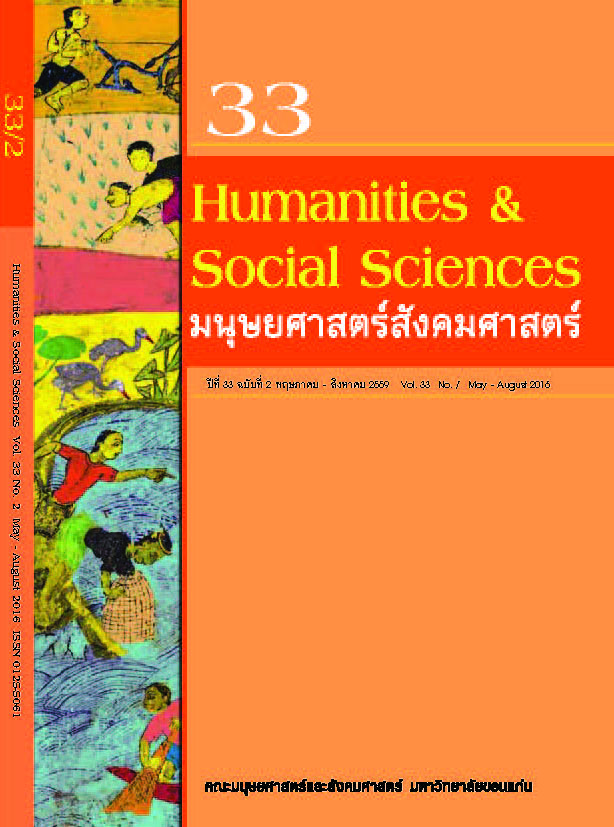ความสุขในผญาภาษิตผ่านกรอบคิดของนักเศรษฐศาสตร์ความสุข
Keywords:
ความสุข, เศรษฐศาสตร์ความสุข, ผญาภาษิตAbstract
บทคัดย่อ
โดยธรรมชาติมนุษย์มีเจ้านายคือความทุกข์กับความสุข แต่คนอีสานที่พบในผญาภาษิตหรือภาษิตอีสานถูกความทุกข์ปกครอง วิถีชีวิตของคนอีสานเป็นกระบวนการบรรเทาความทุกข์มากกว่ามุ่งแสวงหาความสุข ชีวิตที่มีความสุขเป็นผลพลอยได้จากการทำให้ความทุกข์คลายลง เมื่อมองความสุขผ่านกรอบคิดของนักเศรษฐศาสตร์ความสุขทำให้พบว่านักคิดจากสองสังคม คือ สังคมชาวนาอีสานซึ่งยากจน กับ สังคมอุตสาหกรรมของประเทศร่ำรวย ซึ่งต่างกันทั้งมิติด้านเวลาและวัฒนธรรม แต่กลับเห็นตรงกันว่า “เงิน” เป็นปัจจัยช่วยให้คลายทุกข์ แต่ไม่ใช่ปัจจัยสำคัญที่ทำให้ชีวิตมีความสุข ถ้าต้องการความสุขก็ต้องมีปัจจัยอื่นอีก นั่นคือ มีความสัมพันธ์ที่ดีในครอบครัวและมีค่านิยมที่ดี แล้วยังจำเป็นต้องมีปัจจัยอื่นเสริมด้วย ได้แก่ การทำงานที่มีคุณค่า การมีสังคมและเพื่อนฝูง มีสุขภาพดี มีอิสระในชีวิต
คำสำคัญ: ความสุข; เศรษฐศาสตร์ความสุข; ผญาภาษิต
Abstract
Nature has placed mankind under the governance of two sovereign masters, pain and pleasure. But Isan people, as found in Phayapasits or Isan proverbs, were governed by pain. Isan’s way of life is the process of diminishing their pains rather than happiness cultivation. A happy life is a by-product of decreasing suffering. Analyzing and interpreting the concept of happiness from the perspective of Happiness Economist, it is found that the thinkers from different social backgrounds, e.g., one from Isan peasant society, another from industrial society of affluent country, both agree in principle that money is a factor to decrease suffering yet is not a necessary condition to make one happy life. In order to make one’s life happy, they propose another important factor to be applied in life, i.e., to have a good relationship among family members, to have right value. Other supportive factors are to have good and beneficial work, to be in a good community and with good friends, to have good health and to have freedom in life.
Keywords: Happiness; Happiness; Economy; Isan Proverbs



